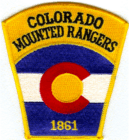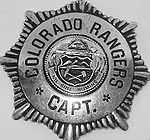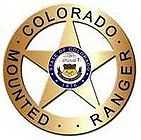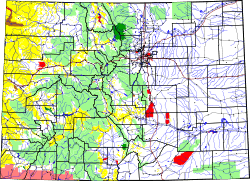Colorado Mounted Rangers
| Colorado Mounted Rangers | |||||
| Common name | Colorado Rangers | ||||
| Abbreviation | CMR | ||||
 | |||||
| Modern Day Shoulder Patch | |||||
 | |||||
| Captain's Badge - Circa 1920's | |||||
 | |||||
| CMR Badge - Circa 1960's | |||||
 | |||||
| Modern Day Badge, Gold for Squadron Officers, Silver for Rangers | |||||
| Motto | Protecting and Serving Colorado Since 1861 | ||||
| Agency overview | |||||
|---|---|---|---|---|---|
| Formed | 1861 | ||||
| Preceding agency | Jefferson Rangers | ||||
| Volunteers | Yes | ||||
| Legal personality | Non government: Non-profit | ||||
| Jurisdictional structure | |||||
| Operations jurisdiction* | State of Colorado, USA | ||||
 | |||||
| Map of Colorado | |||||
| Size | 104,185 square miles (269,840 km2) | ||||
| Population | 4,861,515 (2007 est.)[1] | ||||
| Legal jurisdiction | As per operations jurisdiction. | ||||
| General nature |
| ||||
| Operational structure | |||||
| Rangers | ~200 | ||||
| Cadets | ~15 | ||||
| Parent agency | Colorado Office of Emergency Management | ||||
| |||||
| Website | |||||
| http://www.coloradoranger.org/ | |||||
| Footnotes | |||||
| * Divisional agency: Division of the country, over which the agency has usual operational jurisdiction. | |||||
The Colorado Mounted Rangers, also known as the Colorado Rangers, are a statutory state law enforcement auxiliary that assists law enforcement and other first responder agencies across Colorado. Rangers annually provide more than 50,000 volunteer hours to the State of Colorado supporting local police and sheriffs departments. Rangers are unpaid and the Auxiliary is not funded by tax dollars. The Rangers are the oldest statewide law enforcement agency in Colorado, originally organized in 1861.
History
The Rangers trace their roots to the Jefferson Rangers, keeping the peace in the unofficial Jefferson Territory during the Pikes Peak Gold Rush. In 1861, as the Colorado Territory was established, they were reorganized as the Colorado Rangers continued to serve as Colorado's only statewide law enforcement agency thru the 1920s. The Colorado Rangers were fashioned after the well known Texas Rangers and served as both law enforcement and state militia. The Colorado Rangers often fought on horseback with repeating revolvers and were instrumental in the Battle of Glorieta Pass, helping to stop the Confederate advance towards the Colorado Gold Fields. This is known as the "Gettysburg of the West"
After the Civil War, the Colorado Rangers returned to their law enforcement duties. From time to time the Rangers were also called upon by Colorado's Governors to keep the peace during times of civil unrest, natural disasters, and during disputes such as the violent Labor Wars in Colorado's mining towns.
Rangers were also utilized by Denver District Attorney Philip Van Cise to break up organized crime and corruption in Denver's City Hall in the early 1920s. In 1922 Van Cise set up an independent investigation of the Blonger gang, secretly funded by a group of wealthy Denver citizens. On August 24 of that year, Van Cise used a special force of Colorado Rangers to capture 33 suspects in a single day. Fearing that the Denver Police would tip off the gang once the first suspect was taken to jail, Van Cise detained the gang members in the basement of the First Universalist Church, where he was a member, until the sweep was complete. In Colorado's longest and most expensive trail to that time, 20 con men, including Lou Blonger, were convicted and sent to prison, effectively busting the "Million-Dollar Bunco Ring."[2]
As a result of a campaign promise to organized labor and other interests, Governor William E. Sweet signed an executive order on January 29, 1923, cutting off funding and effectively disbanding the Rangers. This left Colorado without statewide police protection until 1935 when the Colorado State Highway Courtesy Patrol (later becoming the Colorado State Patrol) was formed.
Reorganization
While serving as Governor, Teller Ammons re-organized the Colorado Rangers as the Colorado Mounted Rangers, an all volunteer law enforcement organization. On February 21, 1941, they were formally incorporated with a single Troop in Bailey. In 1955 with a growing role in civil defense, under the guidance of Teller County Sheriff Rufus Jones, the Colorado Mounted Rangers changed their Constitution to form a squadron of Troops throughout the state. To this day, Rangers serve as an unpaid volunteer auxiliary to any agency that requests their assistance.
Law Enforcement Auxiliary per C.R.S § 24-33.5-822
In 2012, Governor John Hickenlooper signed Senate Bill 12-072 (Link) into law, formally recognizing the Ranger's role as a Law Enforcement Auxiliary in the Colorado State Statutes.
"Therefore, the general assembly declares that the Colorado Mounted Rangers should be established as an all-volunteer, unpaid auxiliary unit for the purpose of lending assistance to emergency management, fire-fighting, emergency medical service, search-and-rescue agencies, and law enforcement agencies in the state." [3]
Section 24-32-2222 in Senate Bill 12-072 was then harmonized with House Bill 12-1283 and relocated to section 24-33.5-822 placing the Rangers under the Department of Public Safety in 24-33.5 C.R.S.
The Colorado Mounted Rangers currently have Memorandum of Understandings (MOU's) filed with the Colorado Division of Homeland Security and Emergency Management [4] partnering with nearly four dozen law enforcement and government agencies including State, County and local agencies. Rangers regularly provide additional personnel to these agencies when requested. Rangers act as Peace Officers during their assistance to the agencies they support under their Memorandum of Understanding agreements. Rangers acting under the MOU are under the direction and supervision of the Law Enforcement Agency they are supporting.[5]
Recognition
In 1999, fallen Ranger Edward P. Bell was included in the Colorado Law Enforcement Memorial.[6][7]
In 2001, The Colorado House of Representatives passed HR 01-1009 to recognize and honor the Colorado Mounted Rangers.
In 2002, The Colorado State Senate passed SR 02-008 to recognize the service of the Colorado Mounted Rangers since 1861.
In 2004, Governor Bill Owens declared Feb. 21, 2004, "Colorado Mounted Ranger Day".
In 2011, fallen Ranger Edward P. Bell's name was enshrined at the National Law Enforcement Officers Memorial in Washington, D.C.[8]
In 2011, United States Senator Michael Bennett recognized the Rangers 150 years of service to the citizens of Colorado.
Unfunded Non-Profit Organization
The Colorado Mounted Rangers are not funded by tax dollars and depend on donations and grants to fund their operational budget. The Colorado Mounted Rangers are an IRS registered 501(c)(3) non-profit organization incorporated in the state of Colorado and is tax exempt. The terms Colorado Rangers and Colorado Mounted Rangers are registered trademarks (since 1941)
See also
- Arizona Rangers
- New Mexico Mounted Patrol
- Texas Rangers
- California State Rangers
References
- Van Cise, Philip S. Fighting the Underworld. (Cambridge, Mass.: The Riverside Press, 1936)
- McClure, Carleton E. History of the Colorado Mounted Rangers. (Minute Man Press, 1982)
External links
Present troops
- Troop B - Cripple Creek, Teller, and Park Counties
- Troop D – Durango, La Plata County, and surrounding areas
- Troop H - Denver Metro - North
- Troop I – Colorado Springs, El Paso County, and surrounding areas
- Troop J - Cañon City, Fremont County, and surrounding areas
- Troop K - Denver Metro - South
Other links
- FEMA's Citizen Corps V.I.P.S. (Volunteers In Police Service) Colorado Mounted Rangers link
- Denver Post, Oct. 1, 2000 - Rangers still serving State
- Nov 2002 article in Police Magazine - Living Law Enforcement History
- Colorado Law Enforcement Officers' Association article on the Rangers - Fall 2010 Issue
- Official website